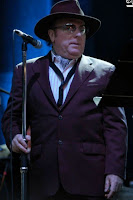Recorded in just a few short sessions, Astral Weeks was the first, and most artistically important, collection of songs that Van Morrison would ever produce. One song flows to the next in a dreamlike wave of acoustic guitars and flutes. Van's vocals are fresh, meandering, and inspired, and the lyrics are undoubtedly the most profound he's ever conjured. In an industry where originality is almost impossible, Astral Weeks leaves the listener feeling like he's been let in on some grand secret. Indeed, this is music of the highest grade, the likes of which has never been matched. The grandeur of the songwriting and musical accompaniment is inexplicable and heavenly. Although Van released dozens of quality albums following Astral Weeks, he was never able to match its spontaneity and sheer goodness.
Although the record, as a whole, is a towering, grandiose composition, the opening track lulls the listener into rapture with its unassuming, hushed melody. "Astral Weeks" yanks us into a seemingly endless song-cyle of love, from the ecstatic beginning to the heart wrenching end. The songs, while interconnected with one another thematically and musically, are strong enough to stand on their own as extraordinary works. "Astral Weeks," for instance, possesses an unstoppable ability to toss its audience onto its own, isolated cloud, with Van wringing out the final words, "in another time/in another place." It's an intricate epic, and one of the finest album openers in all of music.
"Beside You" pervades the same mystical ebb and flow that "Astral Weeks" introduced, and Van's voice twists, turns, stutters, and dribbles, creating a graceful elegance. The song contributes to the aforementioned cycle of a relationship, coloring Van as content, loyal, and eternally in love. Just when it seems that it can't get any better, however, we are proven wrong with the breathtaking "Sweet Thing." The guitar riff is among the most recognizable Van conceptions, and the strings section and base weave together wonderfully, making a memorable, playful sound. It is an articulate love song, and the imagery is appetizing as ever: "And I will raise my hand up into the night time sky/and count the stars shining in your eye." This is certainly not your average, run-of-the-mill ballads.
"Sweet Thing" is followed by an even stronger musical composition, and one of the two landmark achievements of the album. "Cyprus Avenue" is overflowing with personal symbols and images that recall Van's childhood, strolling down the stately Irish street, gazing at the "mansion on the hill" in dumbfounded wonder. The lyrics, which seem rambling and incoherent upon first listen, are actually an accurate portrayal of the feelings of Van's bursting passion. We transpose from the avenue, to the schoolyard, to the railroad, and then back to the avenue again. He sings, "yeah baby my tongue gets tied/every, every, every time I try to speak," providing a glimpse into his songwriting rationale for "Cyprus Avenue." His lyrics, much like his tongue, reveal impassioned and manic impressions of infatuated love.

The soft and ambling conclusion of "Cyprus Avenue" fades into the stunningly upbeat and jazzy "The Way That Young Lovers Do." It is so rollicking and noisy, in fact, that it seems wildly out of place amongst the unassertive tracks that comprise the rest of the album. Whereas the music surrounding it is warmly and invitingly quiet, "Young Lovers" is jarring and somewhat ominous in composition. Although the lyrics portray more of the eloquent, gushing romance of the preceeding songs, we begin to wonder how much longer it can really last.
"Madame George" returns the record to its trancelike quality, and provides one of the most pleasant listening experiences in Van's entire catalogue. The instrumentation is sparse and savory, and the lyrics are, to say the least, enthralling. Madame George is one of the most oft-ananlyzed characters in the tradition of song, with most critics ultimately concluding that she/he is a lonely and troubled transvestite trying to live in the social climate of Ireland. Although Van has repeatedly declined to elaborate on this intriguing character, the loveliness of the song never fails to capture the imaginations of its listeners. At a sprawling duration of almost ten minutes, "Madame George" never wears its welcome; although the musical pace remains consistent throughout, it is uniquely engrossing and engaging.
"Ballerina" seems like another beautiful extension to the underlying confession of love throughout Astral Weeks, but there are strong undercurrents of a developing discontent on Van's part. Lines such as, "you know I saw the writing on the wall/when you came up to me/child, you were heading for a fall," set the audience into a dizzying realization that everything Van has been espousing in the previous tracks is on the verge of a complete collapse.
Sure enough, in "Slim Slow Slider," we find the relationship dead in the water, as Van's lover has incurred spiritual death, and fled to another man. The musical backdrop to this sad tale is lonely and brooding, and Van's voice appropriately conveys despair and melancholy. He laments that "[I] saw you early this morning/with your brand new boy and your Cadillac/you're gone for something/and I know you won't be back." This event presents us with quite a departure from the opening track, which is bursting with romance and affection. As the song frantically flails and flutters to a conclusion, Van gasps out his final words on the matter: "I know you're dying, baby/and I know you know it too." We are talking about spiritual death here, as this forsaken lover has turned into a shell of her former self, leaving Van in the dust trail of her shiny, glossy new Cadillac.
Astral Weeks, from beginning to end, reads like an intricate tale of love and love lost. In various moments throughout the eight momumental tracks, the emotions range from complete sweetness and ecstacy, to cold and piercing bitterness. The songs contained within the confines of this tale are undeniably some of Van's very best; "Astral Weeks," "Sweet Thing," "Caravan," and "Madame George" are all deserving of top-ten rankings in Van's formidable catalog. Furthermore, few albums in modern music have achieved the otherwordly feel that Astral Weeks has, and still manage to lure millions of listeners into their able grasp. There is a reason that most musical critics place this album near the top of their "most important albums" list: this is not only undeniably appealing material, but also potentially life-changing material.
Astral Weeks is the best of the best.
 #25. "Across the Bridge Where Angels Dwell"
#25. "Across the Bridge Where Angels Dwell"




























